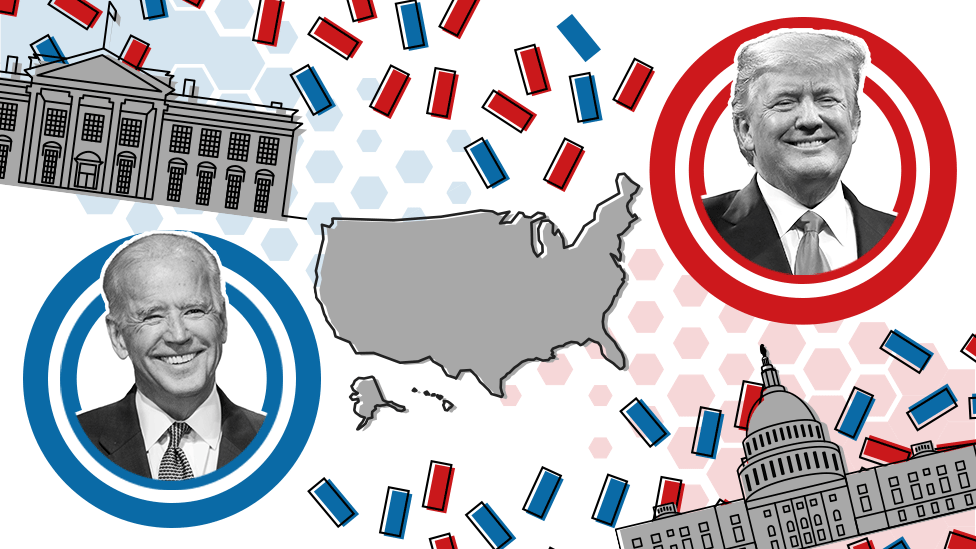US Election 2020: How the world is reacting to knife-edge vote
- Published
Global media see US 'held prisoner' by election anxiety
A US presidential election always courts massive global interest, with the eventual winner playing a leading role on the world stage.
In fact, the decision of the American people every four years can transform the country's foreign policy and its approach to its allies and enemies alike.
So it's no wonder that countries around the world have been paying close attention to the neck-and-neck race for the White House.
Our colleagues from BBC Monitoring have rounded up the global reaction so far.

Relations between the US and China, which are longstanding rivals and duelling economic powers, have sunk to their lowest level in decades.
And both candidates in this election have pledged to be strong in dealing with Beijing.
With this in mind, it's perhaps unsurprising that Chinese state media branded this a "divisive, tense and chaotic" election marred by "unrest, mud-slinging and money politics".
"Many media and people worry that if the election is contested, it may trigger chaos and even social unrest," China's official Xinhua news agency reported on Tuesday.
Meanwhile, the state broadcaster CCTV featured a video report which focused on fears of post-election violence. "There is deep concern about continued social unrest," the report said.
The government, however, has said very little. On Wednesday, a spokesman said it had "no position" on the election.
The story of an extraordinary night...
In Russia, the state-run TV news channel Rossiya 24 has been giving blanket coverage to the election. "We are continuing to follow the madness," one of the presenters said earlier.
It's worth remembering that US intelligence believe Russia tried to sway the 2016 election in favour of Mr Trump, an accusation Moscow has repeatedly denied.
But the two anchors on Rossiya 24 joked about potential accusations of bias towards the incumbent president. "Some comrades... will listen to us now and conclude that we have already declared Trump the winner," one presenter said, to which the other replied: "It is pure mathematics, nothing more."
There has been no official comment from the Russian government, but the pro-Kremlin politician Vyacheslav Nikonov was unafraid to revel in the uncertainty surrounding the result.
"Whoever wins the legal battles half of Americans will not consider them the lawful president," he wrote on Facebook. "Let's stock up on large quantities of popcorn."
Elsewhere in Europe, Germany's Defence Minister Annegret Kramp-Karrenbauer warned that the US was facing a "very explosive situation".
She said President Trump, who has vowed to challenge the election result in the courts, risked triggering "a constitutional crisis in the USA".
"[This is] something that must deeply concern us," she added.
Surveys suggest President Trump - who once claimed he'd charmed Chancellor Angela Merkel - remains deeply unpopular in Germany. And it is well reported that the government in Berlin has struggled to establish a strong working relationship with the Trump administration.
That was wild - a three-year campaign in three minutes
In France, officials struck a different tone and downplayed the significance of the vote.
"Let's not kid ourselves: The United States has not been a friendly partner to European states for several years now," Finance Minister Bruno Le Maire told Radio Classique.
"Whether Joe Biden or Donald Trump is elected by Americans tonight or tomorrow, nothing changes this strategic fact," he added. "The American continent has detached itself from the European continent."
Meanwhile, UK Foreign Secretary Dominic Raab urged caution. "Let's wait and see what the outcome is," he said. "There's obviously a significant amount of uncertainty. It's much closer than I think many had expected."
But that call for caution was seemingly ignored by Slovenia's Prime Minister Janez Jansa, who said the result was "pretty clear".
Twitter flagged a post in which he congratulated Mr Trump and accused the "mainstream media" of "denying facts". His post was labelled with a line that said: "Official sources may not have called the race when this was Tweeted."
Mr Jansa has consistently tweeted his support for the US president and his policies since he became Slovenia's prime minister earlier this year.
With results pouring in, Iran's international-facing state-funded Press TV dropped its scheduled news bulletins to provide special coverage of the American election.
The "threat of civil war" was a prominent talking point, with one presenter saying that, for outside observers, the election "looks very scary".
Rolling state-run news channel IRINN also said the election had been held "under the shadow of fear of unrest".
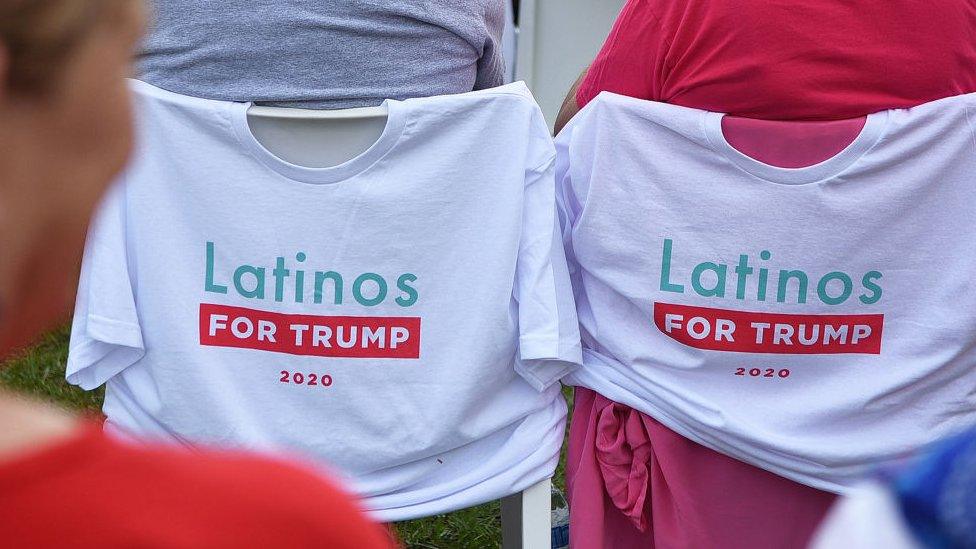
Donald Trump won support from Latino voters in Florida
Latin American media, meanwhile, took particular note of Donald Trump's success in Florida which was boosted by support from Latino voters.
"Trump's victory in Florida buries the prospect of a... Democratic triumph," the prominent Brazilian daily Folha de Sao Paulo said in a headline. "Votes of Venezuelan, Cuban Latinos, and evangelicals, boosted the current president," the paper commented.
Commentators in the region said the Florida outcome showed the Republican president's strategy of associating his Democratic rival Joe Biden with socialism had found resonance among Cuban and Venezuelan exile voters.
"Trump has locked up another key electoral group in Florida: the Cuban Americans and other Hispanics convinced that only the president guarantees that they will be safe from a socialist government," Colombian daily El Espectador said.


- Published13 November 2020
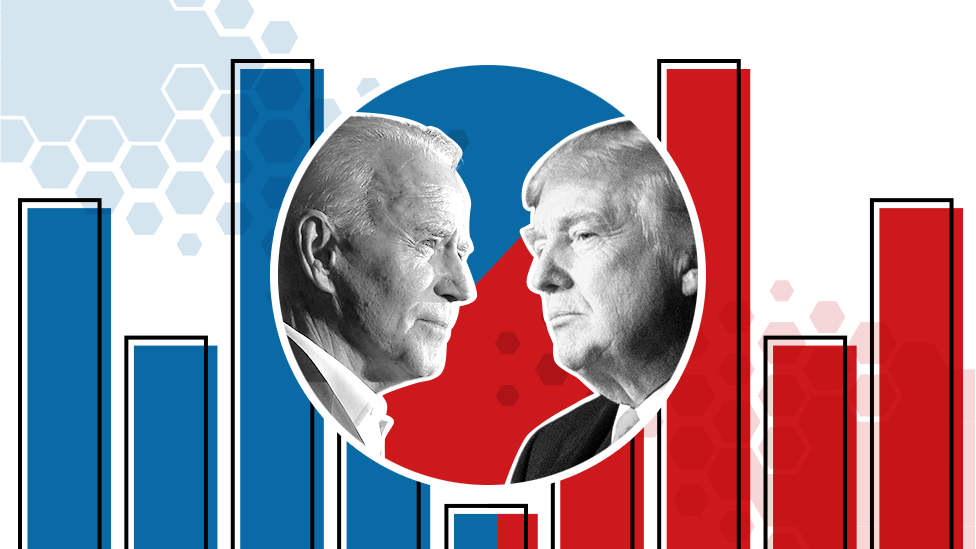
- Published6 November 2020
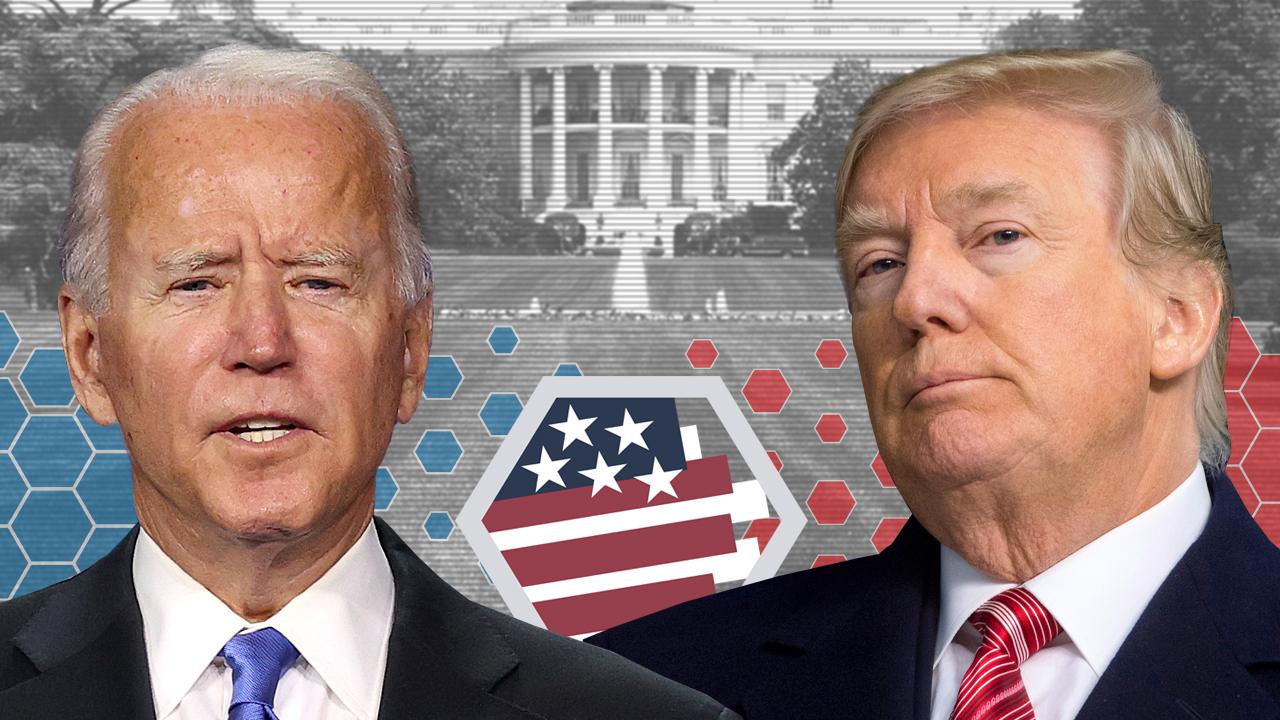
- Published6 November 2020
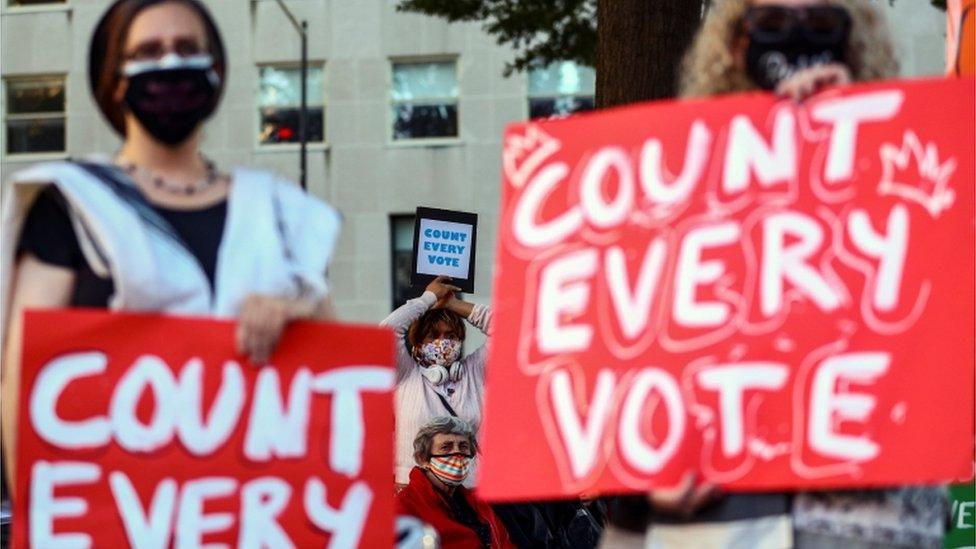
- Published28 October 2020
